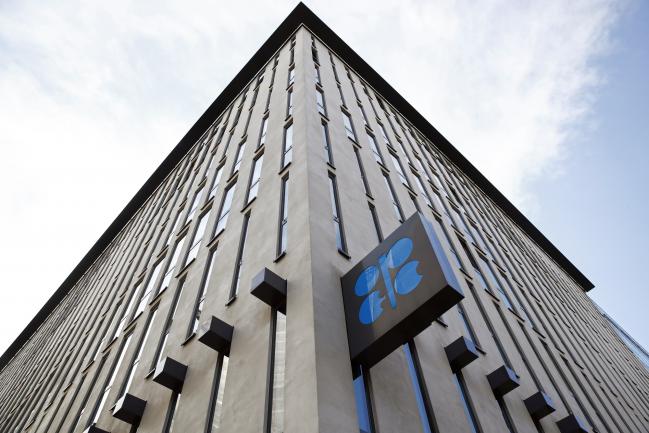(Bloomberg) -- With less than 48 hours to go before a critical OPEC gathering, Saudi Arabia and Russia are set to meet in Vienna for a make-or-break preparatory meeting on Wednesday that’s going to set the direction for the oil market.
The stakes are high after crude prices suffered their largest monthly drop since the global financial crisis in November, and politicians from U.S. President Donald Trump to French President Emmanuel Macron have called on OPEC to keep energy prices in check. Saudi Energy Minister Khalid Al-Falih on Tuesday cautioned an output deal wasn’t done -- at least not yet.
In an interview with Bloomberg, Al-Falih said that it was “premature” to say that the OPEC+ group, which includes allies such as Russia and Kazakhstan, will agree to cut output. His comments were less bullish than last month’s statements in Abu Dhabi when he called for 1 million barrels a day of production cuts. Crude gave up much of its gains on Tuesday following his comments.
“We need to get together and listen to our colleagues, hear about their views on supply and demand,” he said on the sidelines of the United Nations climate change talks in Katowice, Poland. “The next road to cross is whether all countries are willing to come on board and contribute to that cut.”
The opportunity for countries to put their cards on the table comes on Wednesday at the Joint Ministerial Monitoring Committee, the panel that oversees the 2016 deal between OPEC and its allies. Both Al-Falih and his Russian counterpart, Alexander Novak, will attend the meeting, a day ahead of the full OPEC gathering on Dec 6.
Talks Continue
“We are still discussing,” Kuwait Oil Minister Bakheet Al-Rashidi said on his arrival in Vienna Tuesday night.
In private conversations, OPEC delegates said that Russia and Saudi Arabia still differ on how to share the cuts. Another issue is the baseline for the reduction. Some nations want to have it at October output levels while others prefer sticking to the original deal, which used 2016 levels as the base.
It is complicated further by Saudi Arabia and Russia having lifted their production to near-record levels in recent months. The kingdom is currently producing between 11 million and 11.2 million barrels of oil a day, Al-Falih said.
To read about OPEC+ nations’ positions regarding oil, click here
He said that while Moscow backs output curbs “in principle,” the OPEC+ group still needs to “figure out what needs to be done and by how much.”
Any final decision will need the blessing of Russian President Vladimir Putin and Saudi Crown Prince Mohammed bin Salman, who agreed over the weekend to extend their oil-market cooperation.
Trump Pressure
President Donald Trump is also playing an important role. He’s waged a Twitter campaign against OPEC, demanding oil producers keep pumping to bring down gasoline prices for U.S. consumers. Saudi policy makers may be reluctant to go against Trump after the murder of Jamal Khashoggi unleashed a fusillade of criticism from American lawmakers, leaving the president as one of Prince Mohammed’s few remaining allies in Washington.
United Arab Emirates Energy Minister Suhail Al Mazrouei told reporters in Vienna Tuesday that he’s optimistic all countries will join in the OPEC+ agreement.
“I’m hopeful that everyone in and even outside the organization will be supportive to whatever requirements we need to do to balance the market,” he said. “The objective is to balance the market and currently we have seen that there’s a requirement for an adjustment.”
